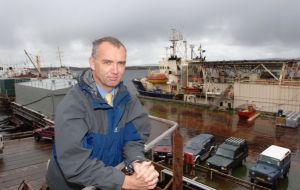MercoPress. South Atlantic News Agency
MSC Certification for Falkland Islands Toothfish reflects high management standards
 The fishery entered assessment in August 2012
The fishery entered assessment in August 2012  “Excellent news for CFL, FIG and the Falklands more generally”, said John Barton Director of Natural Resources.
“Excellent news for CFL, FIG and the Falklands more generally”, said John Barton Director of Natural Resources. Marine Stewardship Council (MSC) certification has been granted to the Falklands Islands Toothfish longline fishery, announced on Thursday Consolidated Fisheries Ltd. (CFL). The fishery is the first in the Falkland Islands to be certified and reflects the high standards of fisheries management and environmental measures practised within the Islands on the Patagonian toothfish fishery.
The fishery entered assessment in August 2012 and was evaluated by independent MSC certifier Intertek Fisheries Certification (formerly Intertek Moody Marine) against the MSC Standard for well-managed and sustainable fisheries in three principle areas: the sustainability of the fish stock, the environmental impacts of fishing activity and the administration system in place for managing the fishery.
The fishery scored well against all the individual performance indicators within each principle achieving a minimum of 80 points on all, bar three performance indicators, giving rise to 3 conditions being placed on the client to be met within the certification period of 5 years. A further condition was voluntarily agreed by CFL - to conduct further research into the identity of the stock in Falkland’s waters -- following objection to the certification by an Argentine NGO, the Fundación Vida Silvestre Argentina.
The fishery is the first in the Falkland Islands to be certified and reflects the high standards of fisheries management and environmental measures practised within the Islands on the Patagonian toothfish fishery. As the clients in the MSC process, Consolidated Fisheries has committed significant investment to achieve international recognition of the sustainability principles promoted by the local fishing industry and the Falkland Islands Government (FIG). It has worked closely with the Fisheries Department who, as overall guardians of the Falklands fisheries, are responsible for the management and scientific research that underpin the good administration of our fisheries
CFL is a local company, established in 1994 and owned by a number of Falkland Island fishing companies and individuals. It owns one vessel, the CFL Gambler, and operates exclusively within the Falkland Islands with Patagonian Toothfish being the sole targeted species. The company is a founding member of the Coalition of Legal Toothfish Operators (COLTO) and funds many scientific research projects into toothfish within the Islands.
The longline toothfish fishery comprises all areas within the Falkland Islands Conservation Inner and Outer Zones beyond three miles of the baseline from which the territorial sea is measured and where the water depth is 600 metres or greater. The current Total Allowable Catch for the fishery is 1,200 metric tonnes per year with the entire quota being held by Consolidated Fisheries Ltd.
Speaking on behalf of CFL, Tom Blake, company Chairman said: “Whilst we have always had every confidence in the standards of fisheries management within our zones, it is pleasing to see that this has been recognized under a highly-respected and valued international certification program like the MSC. We are now committed to assisting the Fisheries Department to meet the conditions placed upon us over the next 5 years and look forward to progressing the overall standards of sustainability within our waters.”
John Barton, Director of Natural Resources (FIG) said: “Achieving MSC certification for the Falklands Islands Toothfish longline fishery is excellent news for CFL, FIG and the Falklands more generally. It demonstrates that both the commercial fishing operations and fisheries management processes are on the right track in terms of sustainability of toothfish, and minimising the impact on the wider ecosystem. The process has involved good collaboration between the Fisheries Department’s fishery scientists and CFL, using data and research acquired over many years. The experience gained on toothfish certification can be built on and applied to other Falkland Island fisheries”.




Top Comments
Disclaimer & comment rules-

Read all commentsOne of the conditions imposed was that CFL was not allowed to catch Patagonian toothfish, so henceforth they are now called Falkland toothfish. They were indentified by Joe Bloggs yesterday while walking his dog.
Mar 07th, 2014 - 10:43 am 0Commenting for this story is now closed.
If you have a Facebook account, become a fan and comment on our Facebook Page!